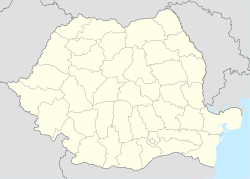Dej
| Dej | ||
|---|---|---|
| Municipality | ||

Dej Calvinist Church
|
||
|
||
| Location on Romania map | ||
| Coordinates: 47°05′14″N 23°48′19″E / 47.08722°N 23.80528°ECoordinates: 47°05′14″N 23°48′19″E / 47.08722°N 23.80528°E | ||
| Country |
|
|
| County |
|
|
| Status | Municipality | |
| Government | ||
| • Mayor | Costan Morar (Social Democratic Party) | |
| Area | ||
| • Total | 109.12 km2 (42.13 sq mi) | |
| Population (October 20, 2011) | ||
| • Total | 31,702 | |
| • Density | 290/km2 (750/sq mi) | |
| Time zone | EET (UTC+2) | |
| • Summer (DST) | EEST (UTC+3) | |
| Website | http://main.dej.ro/ | |
Dej (Romanian pronunciation: [deʒ]; Hungarian: Dés; German: Desch, Burglos; Yiddish: דעעש) is a city in northwestern Romania, 60 km north of Cluj-Napoca, in Cluj County. It lies where the Someşul Mic River meets the river Someşul Mare River. The city administers four villages: Ocna Dejului (Désakna), Peștera (Pestes), Pintic (Oláhpéntek) and Șomcutu Mic (Kissomkút).
The city lies at the crossroads of important railroads and highways linking it to Cluj-Napoca, Baia Mare, Satu Mare, Deda, Bistrița, and Vatra Dornei.
According to the 2011 Romanian census, there were 31,702 people living within the city.
Of this population, 86.6% are ethnic Romanians, while 12% are ethnic Hungarians, 1.1% Roma and 0.3% others.
Dej in 1902
The City Hall
City Square at Night
Avram Iancu Street
Synagogue in Dej
Pentecostal Temple in Dej
The Roman Catholic Church
Greek-Catholic Church in 1 Mai
Andrei Muresanu National College
Graves in the Jewish cemetery of Dej
...
Wikipedia


